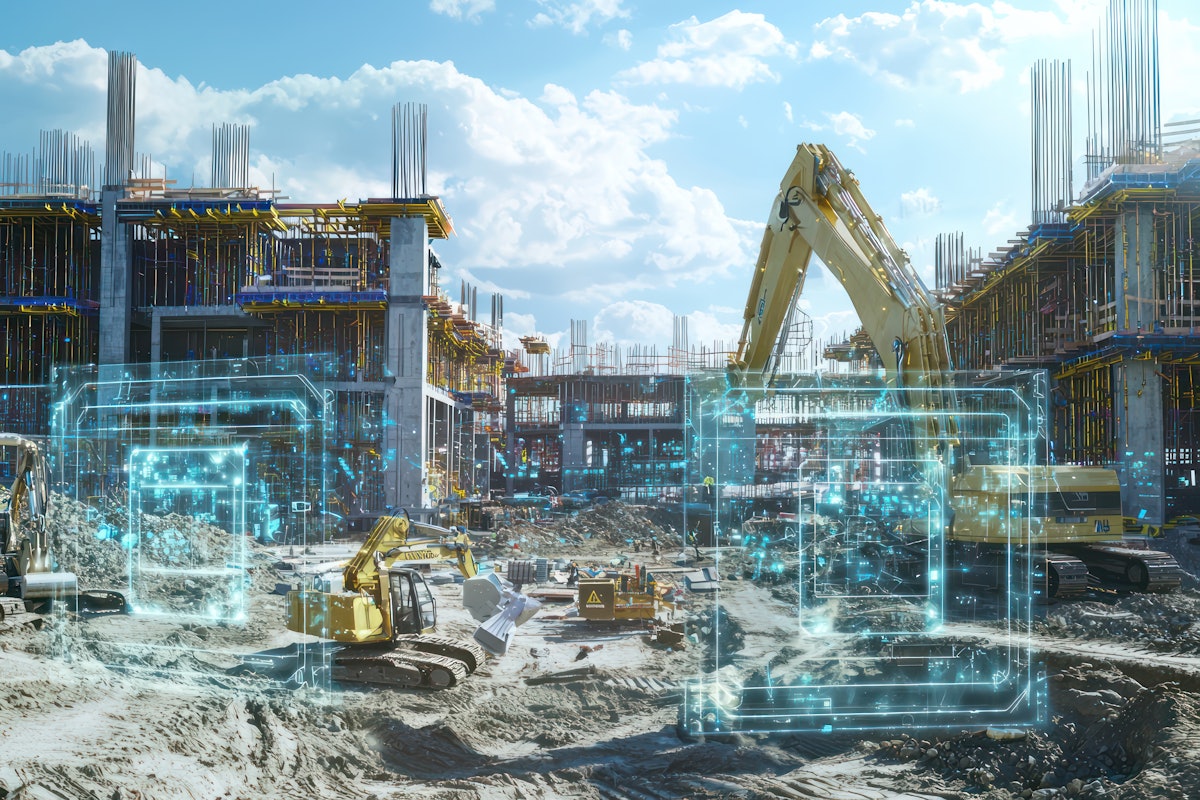The construction industry is booming, projected to grow by $4.2 trillion globally over the next 15 years. But this growth faces a challenge: a widening skills gap, with job vacancies up 41% year-over-year and a wave of retirements looming. AI offers a powerful solution, poised to significantly improve how projects are designed, built and managed.
Currently, data silos plague the industry. A 2024 study found workers spend 18% of their time searching for information, and 43% believe better data access would improve decision-making. AI can help bridge this gap, converting raw data into actionable insights. By analyzing schedules, predicting risks, and optimizing resources, AI enables a more efficient and attractive work environment.
AI’s influence is expanding across the entire construction lifecycle. In preconstruction, it’s already proving invaluable for feasibility studies, material optimization and precise cost estimations. As construction progresses, AI can provide real-time progress tracking, predictive analytics for proactive issue prevention and insightful Building Information Modeling (BIM) analysis. Even after project completion, advanced capabilities like predictive maintenance schedules and energy monitoring systems can continue to deliver value by optimizing operational efficiency, reducing costs and improving sustainability.
Accelerated AI Adoption in Construction
Several key factors are propelling the adoption of AI in construction. For starters, the construction industry has reached an inflection point in its technological evolution, following a progression seen in other industries from standalone point solutions to first-generation platforms, and now to truly intelligent platforms that synchronize activities and empower teams with predictive capabilities.
This growth forecast reflects three fundamental shifts in the field:
- Cost pressures and labor shortages have made efficiency improvements critical. Cost control remains a primary motivator, as AI can identify potential cost overruns early on and optimize resource allocation throughout the project lifecycle. For example, a study estimates that AI-powered predictive analytics can reduce project costs by up to 15%.
- Companies are working to break down their data silos to increase cross-team collaboration.
- The democratization of AI tools has made implementation more accessible.
How AI Is Transforming the Business of Construction
Unlike manufacturing with its controlled environments, construction projects are complex ecosystems with countless variables — from weather conditions to regulatory requirements to multiple stakeholders with competing priorities.
Safety, always a top priority in construction, can be significantly improved through AI’s ability to predict potential risks, monitor equipment performance for early signs of failure, and proactively detect hazards on the jobsite. This can translate to fewer accidents and a safer work environment for everyone involved.
AI can also enhance the efficiency of planning and design processes. By enabling efficient schedule evaluations, streamlining design iterations, and providing comprehensive 3D model analysis, AI helps project teams optimize designs and identify potential issues before they become costly problems.
Productivity can also receive a substantial boost from AI integration. Streamlined material procurement, optimized resource allocation, and predictive maintenance schedules help minimize downtime and allow projects to progress smoothly. Moreover, quality control is elevated through meticulous design analysis, the increasing use of robotic precision in construction tasks, and AI-powered inspections, resulting in higher-quality finished products.
Furthermore, AI can promote more sustainable construction practices by optimizing energy usage and facilitating comprehensive energy audits. This is particularly important considering the construction industry accounts for over 20% of global carbon emissions. AI can also help construction firms adopt more sustainable practices by minimizing waste, optimizing material usage and promoting eco-friendly construction methods.
Real-World Applications of AI in Construction
The transition from hypothetical possibilities to practical applications of AI in construction is already underway, with pioneering projects demonstrating its transformative potential. Real-world examples showcase the tangible impact of AI in construction. The Burj Khalifa, the world’s tallest building, employs an AI-powered maintenance system to monitor its vast network of elevators, escalators, and other critical machinery. This system can even detect the slightest signs of potential machine failure, enabling proactive maintenance and minimizing downtime.
The future of AI in construction is brimming with potential. While the technology’s adoption continues to increase, the journey from implementation to true transformation hinges on three critical factors:
- Connection — Breaking down data silos to create a unified view of projects and portfolios, connecting teams around shared information
- Intelligence — Leveraging historical and real-time data to power predictive analytics that identify potential risks before they materialize and recommend optimal solutions
- Orchestration — Synchronizing activities across the entire construction ecosystem, ensuring that all parties work together according to central project goals with real-time visibility into changes
This growth will be driven by the increasing integration of AI with BIM and robotics, creating a synergistic ecosystem of advanced technologies. Most importantly, the focus remains on augmenting human expertise, empowering construction professionals with powerful AI tools to enhance their capabilities and drive innovation.
AI technology is continuing to evolve, and it’s likely to continue making a huge impact on the way construction teams achieve their safety, efficiency and sustainability goals. To benefit from these advancements, construction firms should invest in AI training for their workforce and pilot AI-powered solutions on key projects. The future of construction is intelligent, and those who embrace AI today will be best prepared to succeed.
View the original article and our Inspiration here


Leave a Reply